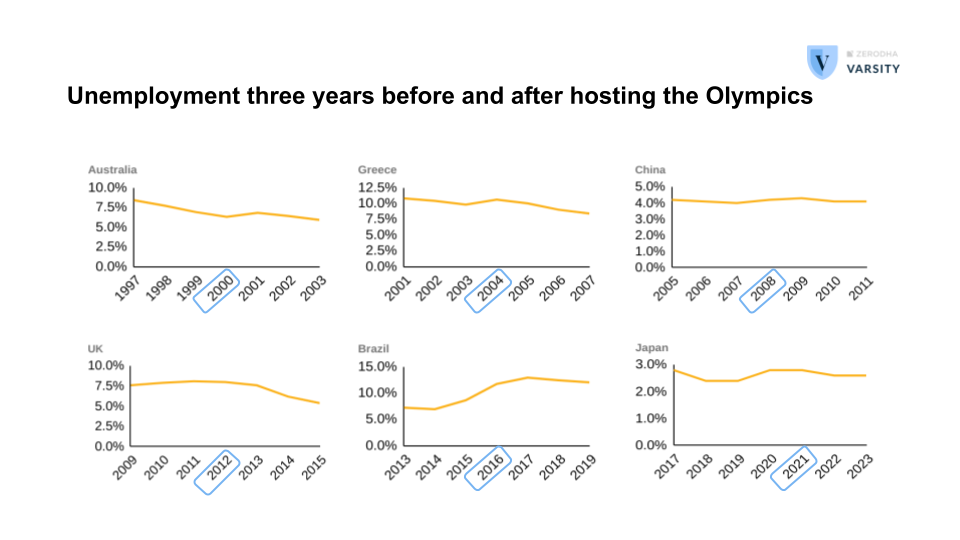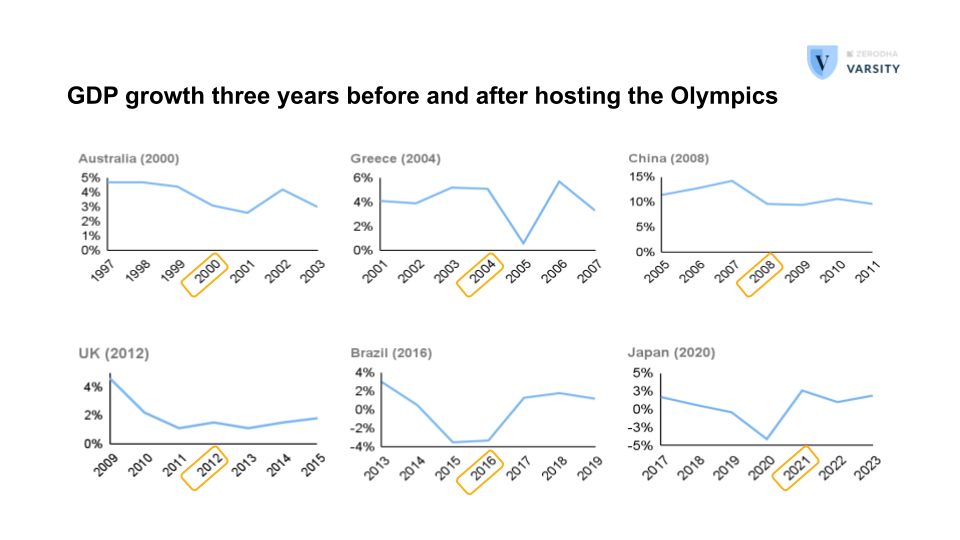
The Economics of Olympic Games
It took the city of Montreal 30 years to pay off the debt it had taken to host the 1976 Olympics. Soon after hosting the game, Montreal declared a large deficit. This was the first time that the wider economic impact of hosting the Olympics was being discussed.
Why do countries host the Olympics? Is there any economic benefit to hosting the Olympics? Or is it done for strategic purposes?
There is no definitive answer. Beyond the direct expenses and revenues associated with hosting the Olympics, there is also a multiplier effect that impacts the civilians of the hosting country. Hotels, restaurants, cabs, tourist attractions, local markets, and other businesses in the hospitality industry are likely to benefit. Other businesses might face disruptions—traffic, pollution, wastage, and garbage. It is difficult to assess how much each of these businesses or entities makes or loses money.
The host country also hopes to improve its soft power by displaying its culture, traditions, and heritage. It is an opportunity to show its infrastructure to the global audience and businesses. The motive is to attract more businesses into the country, thereby hoping to improve employment opportunities. It could also give a fillip to the country’s tourism. These are all considered economic benefits that are difficult to fully quantify and mostly riddled with assumptions.
I looked at the six Olympic Games preceding the Paris Olympics 2024 and tried to assess the employment numbers of the hosting countries in the three years before and after hosting the event.
Employment has improved in most countries. The charts below show unemployment numbers declined or remained stable in the years after hosting the games. Whether or not the games were a cause for this decline in unemployment might be difficult to establish, but a correlation is visible.

A decline in unemployment in the years leading up to the year the games are hosted might seem intuitive, as the country would employ more resources in revamping its infrastructure. However, that does not seem to be the case. Australia witnessed a clear decline in unemployment, while Brazil witnessed ballooning unemployment numbers.
Many observers also contend that the host countries see a growth in exports after the games. So, I also looked at the trade data. In the year immediately after hosting the games, exports declined in most cases and picked up in the second year. The findings are largely inconclusive. For some countries, export growth slowed after hosting the games, while for others, it rose.
Lastly, was there any impact on the GDP growth of the hosting countries of the past six Olympic Games?
I looked at the GDP growth of the six countries that hosted the Olympic Games before France. Their GDP growth data seems inconclusive. In most cases, GDP was declining in the years leading up to the year of hosting the games. A growth bump after hosting the game, if at all, as was in the case of Greece or Brazil, did not last long. While Japan had to delay its Olympics by a year due to Covid, its GDP chart does not look any more whimsical than the other countries.
France’s GDP growth is expected to be slower in the years to come.

Historically, developed countries have mostly hosted the Olympics. China changed that when it hosted a successful Olympics in 2008. It was a way for China to showcase its economic progress to the world.
Brazil, also a developing country, hosted an Olympics in 2016 right after coming out of a recession. But it faced challenges. The city of Rio, where Brazil hosted the 2016 Olympics, had to take a $900 million bailout from the central government after hosting the games.
Brazil’s Rio Olympics are estimated to be the most expensive Olympics hosted to date, with operating costs running well over $11 billion. Operating costs are those that deal directly with hosting the games. They do not include building the wider infrastructure such as roads, railways, airports, hotels, parks, recreation facilities, sanitation, etc., basically the things that developing countries have to spend more on.
This seems like an advantage for the local public, who get better infrastructure facilities. However, the government should ensure better infrastructure regardless of whether or not they are hosting the games. Spending only on the infrastructure would surely be cheaper than spending on both infrastructure and the games.
Almost every host country in recent decades has exceeded its budget by at least 100%. Paris has also overshot its expenses to about $8 billion. However, if its final costs remain around that number, it will be among the cheapest Olympic games hosted, adjusted for inflation.
The cost of hosting aside, the cost of even contesting to host an Olympics runs over $100 million. Such spending doesn’t guarantee that a country will win, but countries continue to bid to host the Olympics.
Since the numbers are inconclusive, one could perhaps conclude that it is the narrative that matters. The Olympic Games might be a government’s way of displaying its political muscle, economic prosperity, religious supremacy, or geopolitical dominance. And that might warrant a whole new post. 🙂
